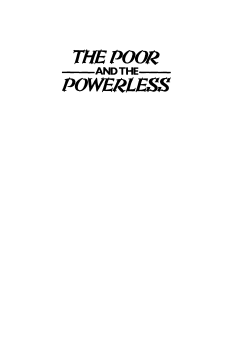
Additional Information
Book Details
Abstract
Foreign interests have dominated the economic development of the Caribbean since the first arrival of Europeans in the region five centuries ago. From the plantation system and slavery to the exploitation of oil and bauxite by the multinational corporations, the history of the Caribbeau people is one of dependency and impoverishment. For the great majority, past and present- slaves, indentured laborers, p easants and workers, the unemployed- the region's subjection to extemal control has meant systematic hardship and social injustice. in this survey of economic development in the Caribbean, Clive Thomas traces the history of colonialism and neocolonialism from the perspective of this majority. Drawing lessons from numerous historical cases, Thomas argues that another form of development- by the poor and for the poor- is not only possible but necessary. The Poor and the Powerless offers a radical appraisal of the Caribbean's past vulnerability to foreign control and its future prospects for genuine independence.
Table of Contents
| Section Title | Page | Action | Price |
|---|---|---|---|
| Title Page | iii | ||
| Copyright Page | iv | ||
| Table of Contents | v | ||
| Map | x | ||
| Preface | xii | ||
| Introduction | 1 | ||
| Part I: Roots | 9 | ||
| 1: Conquest, Settlement and Slavery: The Makings of the Colonial Economy | 11 | ||
| I: The Treasure of the Indies: Conquest, Plunder and Rivalry | 12 | ||
| II: Colonial Settlement: Slavery and the Rise of the Plantation | 19 | ||
| 2: Transition: From Colonial Slave Economy to Centre-Periphery Relations | 29 | ||
| I: The Collapse of the Colonial Slave Economy and the Rise of the Peasantry | 30 | ||
| II: Imperialism, Dependency and the Rise of Mass Movements | 36 | ||
| 3: Revolt and War: The Caribbean around the Time of the Second World War | 45 | ||
| Part II: Independence and the Nationalist Alternatives | 57 | ||
| 4: Colonialism and Nationalism: Alternative Economic Strategies | 59 | ||
| I: The Colonial Office View of Development for the British West Indies | 60 | ||
| II: National Independence and Economic Strategies | 71 | ||
| 5: Puerto Rico to the Rescue: Industrialisation by Invitation | 75 | ||
| I: The Rationale | 76 | ||
| II: The Practice | 81 | ||
| III: The Results | 90 | ||
| 6: The Caribbean in Boom: Oil and Bauxite | 103 | ||
| I: Survey | 104 | ||
| II: Policy | 110 | ||
| 7: Foreign Plantations, Peasants and the State: The Struggle for Land | 115 | ||
| I: Introduction | 116 | ||
| II: Colonial and Nationalist Strategies in Agriculture | 122 | ||
| III: The State of Agriculture | 126 | ||
| IV: Conclusion | 139 | ||
| 8: The Search for New Poles of Growth: Tourism and Off-Shore Banking | 143 | ||
| I: Introduction | 144 | ||
| II: Tourism Policy | 145 | ||
| III: Statistical Profile | 147 | ||
| IV: The Results | 158 | ||
| V: Off-Shore Banking | 167 | ||
| 9: The State and Institutional Reform | 173 | ||
| Part III: Crisis of the Nationalist Models and Social Experimentation | 183 | ||
| 10: Social Structure, Ownership and Controls: The Basic Issues | 187 | ||
| I: Social Structure and Class | 188 | ||
| II: Ownership and Control | 196 | ||
| 11: National Experiments: The Radical Options | 209 | ||
| I: Democratic Socialism and Conservative Reaction: Jamaica | 210 | ||
| II: Non-Capitalist Development/Socialist Orientation: Grenada | 237 | ||
| III Cooperative Socialism: Guyana | 251 | ||
| 12: National Experiments: The Conservative Options | 267 | ||
| I: Intensification of the Capital-Import Model: Barbados | 268 | ||
| II: Oil Boom and Bust: Trinidad-Tobago | 279 | ||
| 13: Small Countries in a Big World: Metropolitan Versus Caribbean Integration | 301 | ||
| I: Introduction | 302 | ||
| II: West Indian Federation: The Colonial Initiative | 303 | ||
| III: From CARIFTA to CARICOM | 307 | ||
| IV: Performance | 310 | ||
| V: Evaluation | 319 | ||
| 14: Crisis, Reaction, Response: The Caribbean in the Late 1980s | 325 | ||
| I: Crisis | 326 | ||
| II: Reaction/Responses | 329 | ||
| 15: Conclusion: Another Development | 351 | ||
| I: Development: Meaning and Purpose | 352 | ||
| II: Accumulation: Basic Goods and Basic Needs | 363 | ||
| Notes | 371 | ||
| List of Acronyms | 376 | ||
| Bibliography | 379 | ||
| Index | 389 |
